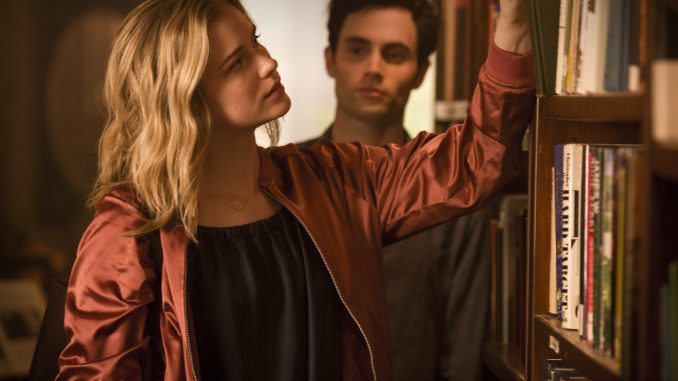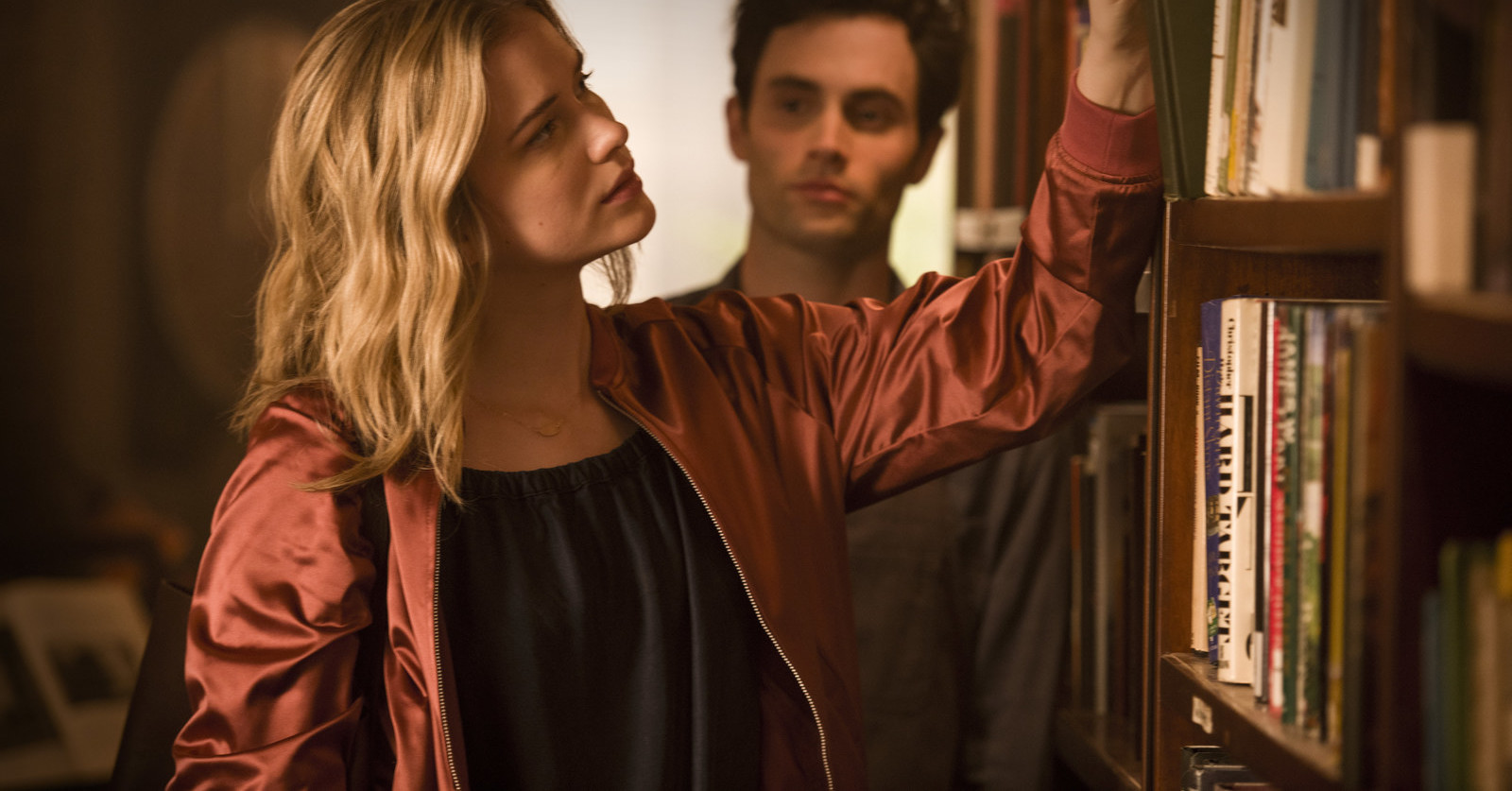

Freshly guilt-tripped by my parents for my naked ring finger and the barren status of my womb, I burrowed deep under the covers of the rickety twin bed that was my home away from home for the holidays and settled in to watch You. Fortunately for me, the Lifetime-turned-Netflix original series initially aired in the fall but appeared on the streaming service just in time for that post-Christmas, pre-New Year week of purgatorial boredom.
“Well, hello there. Who are you?” says Penn Badgley (never better, though this is where I shamelessly confess that I’ve never seen Gossip Girl) in the opening minutes of the pilot, uttered in a tone that carries both wry curiosity and a bit of menace. In a scene shot in warm oranges and yellows, the camera lingers on the (cute!) boots of a young woman browsing in a bookstore. The running narration continues: “You search the books. Fiction? F through K. You’re not the standard insecure nymph hunting for Faulkner you’ll never finish.”
And so begins the story of Joe, the charming bookstore manager who takes a liking to Guinevere Beck (“yeah, my parents were assholes with the whole naming thing”) a lower-middle-class Brown alum now getting her MFA in poetry. She is trying to make ends meet on a TA salary while keeping up appearances with her cadre of rich, catty friends: body-positive Instagram influencer Annika; boy-crazy Korean adoptee Lynn; the deliciously bitchy Peach Salinger (“Yes, that Salinger,” played with delightful menace by Shay Mitchell); and Beck’s douchebag not-boyfriend Benji. Joe’s infatuation with Beck quickly becomes an obsession and, we soon learn, he’s not above bludgeoning a person or two to make sure they don’t get in the way of true love.
The series, which has earned itself a definitive second wind, courtesy of the very real Netflix bump, has been rightfully lauded for its razor-sharp treatise on toxic masculinity — Joe is so dedicated to helping Beck thrive (a true male feminist!) that he kills a few of her toxic friends here and there — and for its cautionary tales about privacy both online (stop posting your geolocations) and IRL (for the love of god, white people, draw your curtains!). You depicts a funhouse New York, where it’s set and filmed, with such charming and hilarious specificity (“Just like a Bareburger wrapped in chard!”) that, sequestered as I was in the prairies of the Midwest, I found myself aching for the city.
And then there are all the little details that make the show smarter than your standard Lifetime melodrama. (Just fast-forward through the parts where Beck reads her writing out loud.) Trans actor Hari Nef was cast as Blythe — the all-too-perfect, pretentious fellow grad student who wrote an “amazing” essay about developing bulimia on a trip to Italy with her mother — and her gender identity is completely irrelevant to the part; she’s as gratingly human as the rest of the cast. A #MeToo storyline involving a handsy professor doesn’t feel forced. And there are organic depictions of the way twentysomethings use social media and apps (Beck’s Instagram handle is Beckdel Test).
But the thing about You that made me a frenzied evangelist to all my friends, particularly my straight female ones, was what it manages to capture about dating in 2019, particularly in a city like New York.
In November, the Atlantic published a cover story by Kate Julian about our so-called sex recession. People in their teens and twenties are having less sex now than their Gen X and Baby Boomer counterparts were at those ages. There are myriad reasons for this shift, according to Julian, in a fairly comprehensive piece that — as is often sadly typical with such articles — tended to focus the bulk of its anecdotal reporting on city-living, middle-class heterosexuals. The proliferation of porn, dating apps, #MeToo, the rise in depression and anxiety — these all make people less likely to date and get intimate.
With the ubiquity of dating apps in particular comes an increasing bifurcation of desire. People don’t just strike up conversations in bars or coffee shops anymore. Everyone’s on their phones. Relationships are less easily defined. “The dating landscape has changed. People are less likely to ask you out in real life now, or even talk to begin with,” one woman tells Julian. Another woman “fantasized to [Julian] about what it would be like to have a man hit on her in a bookstore. (She’d be holding a copy of her favorite book. ‘What’s that book?’ he’d say.)”
Enter You, which begins with that exact ultimate meet-cute: bookstore, witty banter, soft lighting. (The show’s creators say they were trying to subvert rom-com premises, which they do.) Beck’s dating life is essentially a simulacrum of all the angst stirred up by the nebulous nature of so many sexual relationships, the mindless app-swiping, the threat of violence at every turn, ratcheted up to ludicrously entertaining extremes.
When the show begins, Beck is in a situationship with Benji, a financier’s son who’s opening an artisanal soda company (motto: “drink better by hand”) who “hides his privilege with a few Black Lives Matter retweets.” He is a royal douche who cheats on Beck, but still she keeps seeing him and clearly cares for him. It’s as if she doesn’t think she can actually do better. “This is the guy you think you deserve?” moans Joe in a voiceover one episode.
“I don’t just want to be some guy you sleep with,” Benji tells Beck in the first episode, just before he proceeds to sleep with Beck and then ignore her calls. Later, we learn he cares so little about Beck, another girl’s name is the password to unlock his phone.
When that relationship with Benji finally ends, courtesy of Joe and his book mallet, Beck turns to Tinder where she finds instant gratification, amid a glut of app cliches: “Man with tiger” and “Viking wannabes.” And then when Beck finally does find a man who seems willing to commit, it turns out that he was stalking her all along and then MAJOR SPOILER ALERT: ends up killing her. If that’s not the darkest timeline for the hellscape that is modern dating, I don’t know what is.
It’s also actually very fitting in a kismet sort of way that You has attracted all this renewed interest around that time in the new year when the perpetually single resolve to hold their noses and redownload those dating apps.
I, too, have reluctantly decided to wade back into the muck of online dating, and it’s predictably depressing. I’ve been sharing screenshots of the most egregious dating profiles I’ve seen on my (private!) Instagram account (like the Croatian guy who’s “open-minded” but “full disclosure”: “is only into white chicks”). It’s rough out there. And even if you swipe right, you match, you do the awkward text back and forth, it goes well, you meet, you get married, that person might just kill you and use your social media to communicate with your friends and family for a year.
It’s refreshing, then, to see a show that understands the inherent ludicrousness of modern dating — the ambiguity, the risk, the isolation, the threat of violence. “We’d probably have a lot more sex,” one woman says in that Atlantic article, “if we didn’t get home and turn on the TV.” But given what we risk trying to date in the first place, can you blame us? ●

